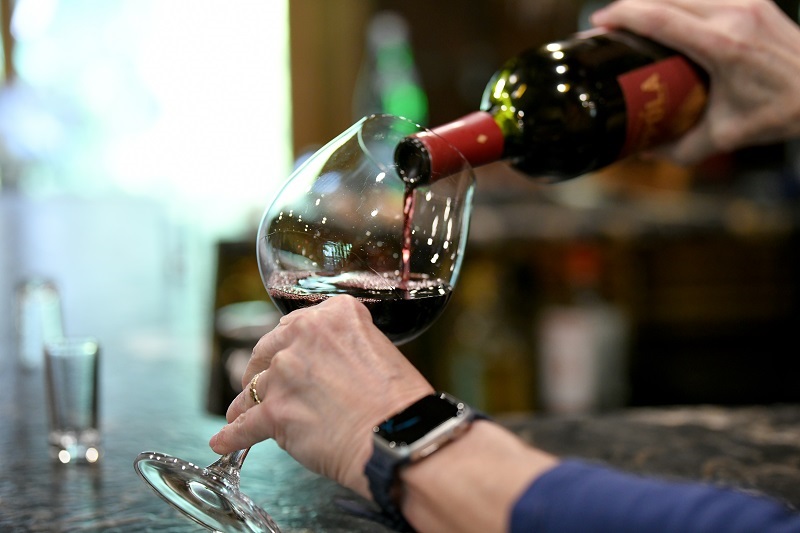Does Alcohol Raise Your Blood Pressure?

October 23, 2023
Do you unwind with wine at dinnertime or beer while watching the game? Beware that regularly consuming any amount of alcohol may increase your blood-pressure levels.
An occasional libation shouldn’t impact your health as much as several drinks per day.
“The amount and frequency that you imbibe may contribute to health problems,” Brett A. Sealove, M.D., chief of Cardiology, Jersey Shore University Medical Center. says. “If it becomes a habit, drinking regularly may lead to hypertension – high blood pressure.”
Along with the risk to your heart, drinking alcohol also increases your risk of several kinds of cancer, including stomach and breast cancers.
How Alcohol May Influence Blood-Pressure Levels
The more alcohol you consume, the more likely it will raise your blood pressure. Some research has shown that drinking moderately or heavily increased the risk of hypertension.
- Moderate drinking. For women, moderate drinking is one drink daily, up to seven per week. For men, it’s one or two drinks daily, up to 14 per week.
- Heavy drinking. For women, heavy drinking is eight or more drinks per week. For men, it’s 15 or more drinks per week.
Even having occasional alcoholic beverages may impact your blood pressure. New research shows that any alcohol consumption may raise blood-pressure levels over time.
“The study participants who consumed any alcohol had higher blood pressure than abstainers,” Dr. Sealove says. “They weren’t diagnosed with hypertension, but drinking increased their blood pressure over time.”
Binge drinking – consuming many drinks in a short period – may also increase hypertension risk. The habit raises blood-pressure levels in men, according to research.
“We recommend against binge drinking in women, as well as men,” Dr. Sealove says. “This is true even though women didn’t experience increased blood pressure in this study.”
- Binge drinking. For women, binge drinking is four or more drinks in a 2-hour period. For men, it’s five or more drinks over the course of 2 hours.
What counts as a single drink? There are set guidelines:
- 12 ounces of beer (5% alcohol by volume)
- 5 ounces of wine (12% alcohol by volume)
- 1.5 ounces of liquor (80 proof, or 40% alcohol by volume)
- 8 ounces of malt liquor (7% alcohol by volume)
What Blood-Pressure Readings Mean
A blood-pressure reading includes two numbers – systolic blood pressure and diastolic blood pressure. Each one measures the pressure within the blood vessels:
- Systolic blood pressure. This measures the pressure within the heart’s arteries when the heart contracts or squeezes.
- Diastolic blood pressure. This measures the pressure within the arteries when they relax between heartbeats.
Blood pressure readings are expressed as fractions, with the systolic number above the diastolic. A healthy reading is lower than 120/80 mm Hg (millimeters of mercury).
People with higher-than-normal blood pressure may fall into these categories:
- Elevated blood pressure. The systolic (top number) is between 120 and 129 mm Hg. The diastolic (bottom number) is less than 80 mm Hg.
- Hypertension, stage 1. The systolic (top number) is between 130 and 139 mm Hg. The diastolic (bottom number) is between 80 and 89 mm Hg.
- Hypertension, stage 2. The systolic (top number) is 140 mm Hg or higher. The diastolic (bottom number) is 90 mm Hg or higher.
Anyone with blood-pressure readings of 180/120 mm Hg or higher is in crisis. Hypertensive crisis is a medical emergency that could cause organ damage.
How to Lower Your Chances of Developing Alcohol-Related Hypertension
If you abstain from alcohol, that eliminates one risk of developing high blood pressure. Limiting your alcohol intake may also have positive effects on your blood-pressure levels.
To help reduce the risk of increasing your blood-pressure levels with alcohol:
- Don’t start drinking alcohol, if you do already, limit yourself. (This includes drinking a glass of wine daily; the benefits haven’t been definitively proven.)
- Limit yourself to one drink daily (for women) or two drinks daily (for men). Never binge drink (four or five drinks in a 2-hour period).
- Aim to abstain from alcohol two or more days per week. It isn’t necessary to drink daily.
- Seek help from your doctor if you can’t reduce your daily/weekly alcohol intake.
Next Steps & Resources:
- Meet our source: Brett A. Sealove, M.D.
- To make an appointment with Dr. Sealove, or a doctor near you, call 800-822-8905 or visit our website.
- Learn more about our heart care services.
The material provided through HealthU is intended to be used as general information only and should not replace the advice of your physician. Always consult your physician for individual care.






